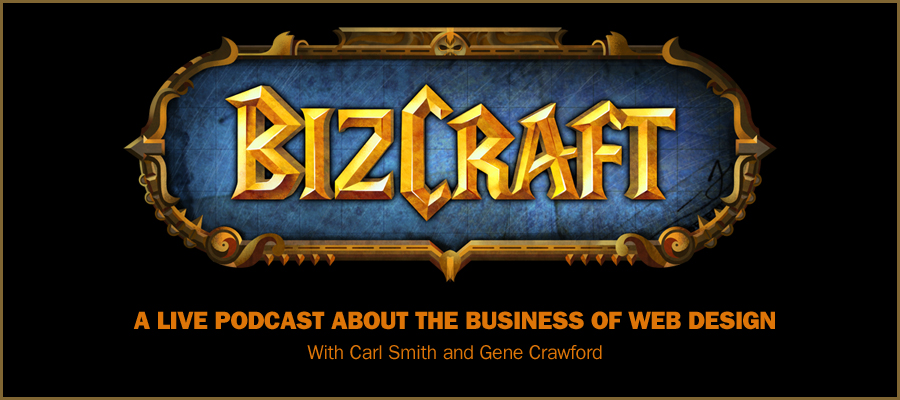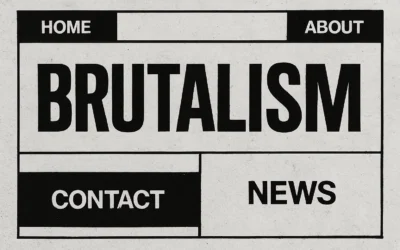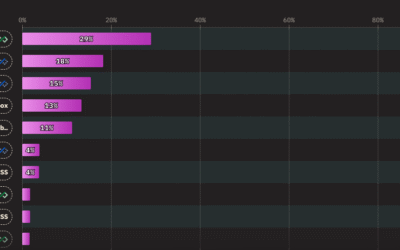
Play or Download this Episode
Download MP3 (41 MB / 00:48:44)
Subscribe to the Show
iTunes / RSS feed / Get Email Updates
About the Show
This is BizCraft, the podcast about the business side of web design, recorded live almost every two weeks. Your hosts are Carl Smith (@carlsmith) of nGen Works and Gene Crawford (@genecrawford) of UnmatchedStyle.
In this Episode of BizCraft we answer a listener question, we discuss sustainability and how not to be a jerk doing it.
We had a follow up question from Harry O’Connor who recently posted to us “again”… on the show before last show’s post.
TLDR:
Main question here is about “sustainability” of the services company/web design shop.
Actually I have some further points/questions which maybe you can discuss? don’t worry if not, but I think they are relevant, certainly to me anyway.
So our company, Voodoochilli, is based in a very small city (70K people I think) but we are very well known locally, and get plenty of work and are rarely quiet. I had an enquiry today from a potential client who is unhappy with one of our competitors. They have been locked into a 3 year contract with them with no access to the CMS which is built, but only used by the web dev team. This really surprised me, because we always build in a CMS for the client and we don’t lock clients into contracts, especially clients like this small charity that is trying to make the world a better place. But it seems some, if not all of our competitors are doing this in order to make a profit. Maybe this is standard practice and I just assumed otherwise?
So this got me thinking – what makes us sustainable? Clearly locking your clients into a contract is sustainable over the duration of the contract as you are getting paid over the time, sometimes without doing any work. What we try to do is satisfy the client’s needs so that they will refer us to other clients or will want more work done later – to retain them not forcibly, but because they want to stay, you know, to be good to them. So I think all of this is all very noble, but from a business point of view I do see the benefits of limiting access to a CMS and forcing a maintenance contract, although ethically I’m not sure it is something I would consider.
So I guess my question is, where do you find the balance between being the good guy and being the sociopathic money making business machine? Is there a happy middle place? We are a small business and we discount for charities, do pro bono work, offer free advice etc, and we do ok, but many of our competitors are pretty shrewd business types (that is being polite) that charge more, care less and certainly seem to be making more money. How can we achieve more without being bad people, or is that simply not possible? Are perhaps we trying too hard to be nice, after all, this is business?
My last question – I promise, is, how do I find out what my competitors are charging? I have had “clients” turn out to be just competitors in the past, asking for quotes etc. Is there a good way to find out without this duplicity? Straight up asking your clients “what did they charge you?” seems a bit rude somehow.
Sorry if this turned into a bit of a diatribe/rant, but I literally just replied to a client and so it got me thinking and I’d certainly love to hear your thoughts on it. Thanks again!
End of the year stuff:
- Performance Reviews
- Bonuses
- Taxes
- Holiday Hours
- First Week Back after the Holidays
- Etc…
Carl’s complaint about “future Carl”; this is a tough time of year, the end of it that is.
- How important are reviews; end of year reviews, quarterly reviews, real time reviews?
- How do you handle reviews. Big companies vs. small companies.
- What you think you’re saying vs. what the employee actually hears.
- How a “360 review” actually works/goes down.
- Greg Hoy’s 360 review post: My Employees Reviewed me, and I Kind of Suck
- The “no sandwich” vs. the “shit sandwich”
Beers During The Show
Gene: NonChalant Blonde IPA Ardwolf
Carl: Dale’s Pale Ale (Can)





Woo hoo! Thanks for answering my questions. I’ve got a long drive ahead of me today and I’m really looking forward to listening your answers while I drive. Thanks again guys!
Ok, just to say I heard both episodes, thank you so much for taking the time to consider my questions. My apologies if I rambled on a bit….now prepare yourselves for this massive block of text! I do not expect you to bring any of this up in your next podcast, I just felt compelled to write, I would also be very interested in hearing some views and comments of your other listeners.
So, I’m not sure how it is over there in the states really, we have a few clients over there including some web shops but the vast majority of our work is local, and over here there seems to be a very cut-throat attitude to the web design business. By this, I mean not only do other web shops pretend to be prospective clients in order to find out our pricing, I’ve had them do it purely to waste out time! I’ve had competitors contact and poach active clients of ours, I’ve had them use our company name in their google adwords campaigns, I’ve had them steal the source code and upload it on their site in order to get up the SEO ranks (how dumb is that?) I’ve even had a rival web design company launch another variation of our domain name – we had to get our company name trademarked in the end. It’s all very petty and ridiculous if you ask me. Honestly, I would much rather work with these people, talk to these people, and share a bit of work and ideas with them, but as I say it seems very cut-throat and they are totally about making a profit, and nothing else it seems. And the reasons for this, is economically, the UK is in a tricky place and web design (with the exception of London our capital) is seen as a non-tangible asset that is massively undervalued considering the value it adds to a business. Typical websites in my city sell for around $2000-3000 and we are in the mid-high end of pricing I believe and often lose work because even though the client would prefer to work with us, one of our competitors is offering to do the whole site, with e-commerce and CMS for $1000…sure, it might be mostly clip art pasted onto a free wordpress theme by a guy in india who is getting paid $10 an hour, but its $2000 cheaper…. We charge around $65 hourly, but there is always someone prepared to charge $30 and make a very marginal profit by keeping costs and quality down, and at the end of the day many clients cannot see the difference. This is my problem.
There is a saying, don’t complete on price, in fact I’m sure you have said this in some of your episodes, and although we are constantly trying to push the quality of work we do and generally raise our prices, it is difficult. I think the one piece of advice that impressed me the most was the idea of contacting people you want to work with. It sounds obvious, but I’m going to pro-actively start doing this. I think the idea of reaching out geographically is good, but I wonder about the logistics with working with businesses hundreds of miles away in terms of meetings etc, and I feel that many clients want someone local.
My last realisation is an answer to “who IS our dream client”. Actually I think it would be safe to say that working yourself is the dream job – by this I mean offering a product or service that doesn’t require clients in the first place. I’m not sure how this is even possible and as you touched on in this episode, launching an online product is a super hard thing to do for us creatives, not marketeers.
Thanks again guys, looking forward to the next episode, I’m hoping some other people will write in too – I think the format works well with questions and answers. Cheers!